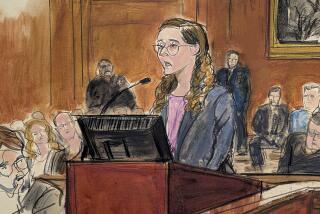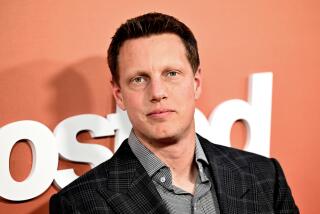Ellison Gives His Reasons for Wanting PeopleSoft
SAN FRANCISCO — Oracle Corp. Chief Executive Larry Ellison testified in a federal antitrust trial Wednesday that the company needed to acquire rival PeopleSoft Inc. in order to compete with bigger competitors.
Ellison said that though Oracle was considering bidding for “three or four” other publicly traded software companies, PeopleSoft would be the best fit because its thousands of customers would allow Oracle to spend more on new products. That “is the only way we could scale our business,” Ellison said.
The testimony came in the final week of the trial over Oracle’s hostile $7.7-billion tender offer for PeopleSoft. The Justice Department wants a federal judge to stop the bid from going forward, arguing that if it succeeds, only Oracle and SAP of Germany will be able to supply human-resources and financial software to the largest companies in the United States.
Answering questions from Oracle attorney Dan Wall, Ellison told U.S. District Judge Vaughn Walker, who is hearing the case without a jury, that PeopleSoft CEO Craig Conway had initially suggested that PeopleSoft and Oracle join forces against SAP. Ellison said that a friendly deal foundered because Conway insisted he be in charge.
Ellison said he decided to pursue a hostile offer a year later, as he realized that Oracle would be squeezed between the dominant SAP and emerging competitors, including cut-rate outsourcing firms and Microsoft Corp.
“Microsoft is always very aggressive when they enter a market,” said Ellison, who in giving the most important sales pitch of his career abandoned his usual black shirt and sports jacket for a suit and tie.
“The second Microsoft enters a market, prices drop like a rock ... up to and including zero.”
Asked why Oracle couldn’t get more customers just by lowering prices, Ellison replied: “That’s what Netscape did. They went out of business.” Netscape was the first Internet browser to win wide distribution and was later crushed by Microsoft. Microsoft’s actions helped trigger a Justice Department antitrust suit that was later settled.
Oracle claims that competition wouldn’t be stifled if the company owned Pleasanton, Calif.-based PeopleSoft. It contends that software makers like Lawson Software Inc. and Automatic Data Processing Inc. serve the same market while Microsoft, which sells business software to medium-size companies, would serve as a check on any price increases because it is poised to enter the high-end market of human-resources and financial software.
In cross-examining Ellison for an hour and a half, Justice trial attorney Claude Scott quoted the billionaire’s previous statements about specialist companies such as Lawson facing disaster as customers turn to more comprehensive sets of programs.
Ellison said that though he still believed that to be true, many large technology buyers disagreed.
Scott tried to pin Ellison down on whether eliminating PeopleSoft would allow Oracle to innovate less and charge more.
Ellison responded: “The price competition is going to get worse.”
At one point, Scott asked whether Redwood City, Calif.-based Oracle had set up a war room to compete for PeopleSoft customers. Ellison first said Oracle had established a number of war rooms against other competitors and then, when asked again about PeopleSoft, said: “I don’t know what a war room is.”
In e-mails introduced Wednesday, PeopleSoft, which was founded by a former Oracle executive, indicated it thought it needed to get bigger in order to compete against SAP and others that offer a more complete set of software and services.
In one, PeopleSoft Chief Technology Officer Richard Bergquist wrote to CEO Conway that the company needed to either narrow its focus or dramatically increase its development spending, “probably through increasing our size.”
Three months later, in June 2003, Conway announced PeopleSoft’s acquisition of mid-market competitor J.D. Edwards & Co.
Within days, Oracle, which also had mulled over buying Edwards, announced its attempt to swallow PeopleSoft.
For all the evidence about the rival strategies of the world’s technology giants, Judge Walker may base his ruling more on drier legal issues, especially how the relevant products and markets are defined.
Last week, Walker asked both sides to offer a clearer definition of “high-function” software, among other things.
Oracle has maintained all along that there is no clear line between the needs of large and medium-size companies, since the software it sells to all its clients is essentially the same. If the market is defined to encompass all manner of customers, no combination of two companies would have a commanding market share.
As Ellison’s testimony ended, Walker asked him whether he considered Edwards to be a mid-market company. With some hedging, Ellison agreed that it was.
Walker will hear closing arguments in the case July 20 and may rule as soon as the next month. If Oracle wins, it still must overcome PeopleSoft’s “poison pill” takeover defense and buy a majority of PeopleSoft’s outstanding shares.
More to Read
Inside the business of entertainment
The Wide Shot brings you news, analysis and insights on everything from streaming wars to production — and what it all means for the future.
You may occasionally receive promotional content from the Los Angeles Times.










